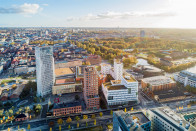Before we begin, let us just say that making games is extremely fun! Sure, we’re biased, but really, it is. Both fun and challenging actually.
Making games is challenging because it requires many different skills. Learning the skills, however, can also be really fun and rewarding. Requiring so many different skills, it also means there are a lot of different roles to choose from when pursuing a career in games!
There really is need for a lot of different types of game developers in the games industry. Not just in our region, in south Sweden, but globally. The industry needs people with all sorts of skills and experiences, and people from all walks of life. Currently the industry - as many other tech heavy industries - is predominantly male, and is therefore especially encouraging women and marginalized genders to join.



